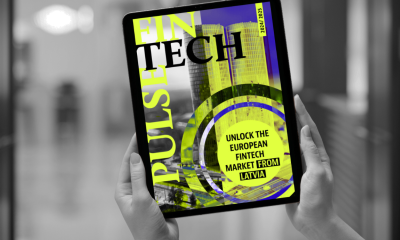Fintech PR
GFT AI.DA Marketplace: The faster way to utilise AI
Modular system with over 20 industry-specific solutions
LONDON, Oct. 16, 2023 /PRNewswire/ — GFT already generated 30 percent growth with artificial intelligence (AI) in 2022. Now the digital transformation group is sharpening its focus on this technology of the future.
GFT has implemented over 200 AI projects for its clients in recent years. In 2022 alone, revenue of €50 million was generated with AI and data platforms. In order to best serve the rapid growth in client demand for predictive and generative AI technology, the company is now launching GFT AI.DA Marketplace – whereby AI.DA stands for Artificial Intelligence & Data. With its comprehensive use case library, methodologies, reference architectures and preconfigured solutions, GFT AI.DA Marketplace accelerates the design and implementation of AI-based applications. At the same time, GFT is continuing to expand its expertise in this area: with a broad-based internal “AI first” programme, all GFT talents are being trained in the use of AI. This is expected to enhance productivity in all areas of the company.
“Over the past few years, our clients have invested heavily in the modernisation of their platforms. With intelligent AI solutions, they can now leverage their benefits exponentially,” says Marika Lulay, CEO of GFT. “With GFT AI.DA Marketplace, we help clients with the fundamental challenge of choosing the right combination of AI solutions. We integrate the use of data platforms to raise productivity, but also to improve the end-user experience.”
Intelligent agent
One example of the potential of the new AI solutions offered by GFT AI.DA Marketplace is the GFT Banking Agent. This virtual assistant enables bank customers to conduct almost all banking transactions using colloquial language, thus saving considerable time. In turn, banks can use it to significantly improve their customer service while at the same time raising efficiency. According to GFT, the solution can be implemented within three months. Further highlights of the GFT AI.DA Marketplace modular system:
- GFT Visual Inspection makes quality control fast, easy and effective.
- GFT Fraud Detection tracks down and prevents unauthorised payments.
- GFT AI Impact Beta simplifies and accelerates software production.
When clients adopt these solutions, they benefit from GFT’s deep technological expertise and many years of experience with AI projects. GFT also cooperates with renowned partners such as Google Cloud, Microsoft Azure and Amazon Web Services. This ensures maximum efficiency and security when integrating AI solutions into IT infrastructures.
Cloud, data and AI are key drivers of digital transformation
Companies need AI technology to get the most out of the vast and valuable amounts of data they manage. And feeding the AI algorithms with data requires a modern cloud infrastructure. Cloud, data and AI are thus the key growth drivers for digital business transformation[1]. With its wide-ranging expertise in cloud, data and AI, GFT covers all key technologies.
“The scalable compute power of the cloud combined with the emerging AI models offer more opportunities than ever before. Having a well established and secure data strategy, supported by a modern data platform means regulated firms will be able to fully embrace the benefits of AI,” says David Tuppen, Head of Data, Analytics and AI at GFT.
Huge market potential for AI
A recent forecast from the International Data Corporation (IDC) shows that global company spending on AI – including software, hardware and services for AI-centric systems – will reach about $154 billion in 2023. This represents an increase of almost 27 percent over the amount spent in 2022. The ongoing incorporation of AI into a wide range of products will result in a compound annual growth rate (CAGR) of 27 percent over the forecast period 2022-2026. Market volume is expected to pass the $300 billion mark in 2026[2].
Agile growth strategy goes beyond AI
GFT anticipates future trends at an early stage. To exploit market potential, the company develops ideas and solutions before technologies are widely applied. This means that its clients are among the first to be able to use new trends productively. In addition to AI, GFT is currently focusing on solutions for the financial sector based on distributed ledger technology (DLT), for example.
“For our clients, as well as ourselves, AI enables a quantum leap towards even greater productivity and competitiveness,” concludes Marika Lulay. “GFT AI.DA Marketplace makes it even easier to use exactly the right technology – be it predictive or now increasingly generative – in everyday business.”
Learn more about GFT AI.DA Marketplace.
1. Gartner, forecast “Worldwide Public Cloud End-User Spending,” April 2023.
2. International Data Corporation Worldwide Artificial Intelligence Spending Guide, March 2023.
Logo – https://mma.prnewswire.com/media/742447/3588671/GFT_Logo.jpg
![]() View original content:https://www.prnewswire.co.uk/news-releases/gft-aida-marketplace-the-faster-way-to-utilise-ai-301957317.html
View original content:https://www.prnewswire.co.uk/news-releases/gft-aida-marketplace-the-faster-way-to-utilise-ai-301957317.html

Fintech PR
Noble Corporation plc announces changes to its share capital including share repurchases for the month of November 2024
SUGAR LAND, Texas, Nov. 29, 2024 /PRNewswire/ — Noble Corporation plc (“Noble”) (NYSE: NE, CSE: NOBLE) today announces changes to its share capital. During the month of November, Noble has repurchased approximately USD 36.6 million of A ordinary shares under its previously announced share repurchase plan at a weighted average price of approximately USD 33.85 per A ordinary share.
During the period since October 31, 2024, 12,536 new A ordinary shares each with a nominal value of USD 0.00001 have been issued.
6,992 new A ordinary shares have been issued to certain holders of warrants as a consequence of the exercise of warrants. The exercise price was USD 19.27 per A ordinary share for 5,845 of the new A ordinary shares, USD 23.13 per A ordinary share for 465 of the new A ordinary shares, USD 124.40 per A ordinary share for 24 of the new A ordinary shares, USD 29.22 per Diamond Offshore Common Stock delivered as Merger Consideration for 648 of the new A ordinary shares and 10 new A ordinary shares were issued as a result of a cashless exercise. The total proceeds to Noble from the warrant exercises amount to approximately USD 0.1 million.
Additionally, 5,544 new A ordinary shares have been issued to certain employees of Noble at no cost as a result of the vesting of restricted stock units.
The new A ordinary shares carry the same rights as the existing A ordinary shares of Noble. The new A ordinary shares will be listed on the New York Stock Exchange as well as admitted to trading and official listing on Nasdaq Copenhagen.
As a result of the changes, there are a total of 160,382,900 A ordinary shares of Noble issued and outstanding with a nominal value of USD 0.00001 each.
Pursuant to section 32 of the Danish Capital Markets Act, Noble also hereby announces the total nominal value of its issued share capital and the total number of voting rights:
|
Number of shares |
Number of voting rights |
Share capital |
|
|
A ordinary shares of USD 0.00001 |
160,382,900 |
160,382,900 |
1,603.82900 |
|
Total |
160,382,900 |
160,382,900 |
1,603.82900 |
Noble has received approval from Nasdaq Copenhagen for a voluntary delisting of its shares on Nasdaq Copenhagen
Noble has on November 18, 2024 received approval from Nasdaq Copenhagen for a voluntary removal from trading and official listing of its shares (in the form of share entitlements) (the “Danish Shares“) on Nasdaq Copenhagen (the “Delisting“).
The last day of trading on Nasdaq Copenhagen will be December 16, 2024 and the Delisting will be effective on December 17, 2024. Following the Delisting, the Danish Shares will no longer be tradable on Nasdaq Copenhagen.
In connection with the Delisting, holders of Danish Shares may:
- Dispose of their Danish Shares on Nasdaq Copenhagen before the Delisting is effective; or
- Convert their Danish Shares to an equivalent number of Noble shares tradeable on the New York Stock Exchange.
Alternatively, holders of Danish Shares may do nothing but will hold an illiquid asset following the Delisting.
For further information about the Delisting or the options available to holders of Danish Shares, see Noble’s announcement of November 14, 2024 regarding the submission of request for removal from trading and official listing on Nasdaq Copenhagen.
Additional information regarding the Delisting can be found on our website at www.noblecorp.com.
About Noble Corporation
Noble is a leading offshore drilling contractor for the oil and gas industry. The Company owns and operates one of the most modern, versatile, and technically advanced fleets in the offshore drilling industry. Noble and its predecessors have been engaged in the contract drilling of oil and gas wells since 1921. Noble performs, through its subsidiaries, contract drilling services with a fleet of offshore drilling units focused largely on ultra-deepwater and high specification jackup drilling opportunities in both established and emerging regions worldwide. For further information visit www.noblecorp.com or email [email protected].
IMPORTANT INFORMATION
This announcement is for information purposes only and does not constitute or contain any invitation, solicitation, recommendation, offer or advice to any person to subscribe for or otherwise acquire or dispose of any securities of Noble.
Certain statements in this announcement, including any attachments hereto, may constitute forward-looking statements. Forward-looking statements are statements (other than statements of historical fact) relating to future events and Noble and its subsidiaries (collectively, the “Noble Group”) anticipated or planned financial and operational performance. The words “targets”, “believes”, “continues”, “expects”, “aims”, “intends”, “plans”, “seeks”, “will”, “may”, “might”, “anticipates”, “would”, “could”, “should”, “estimates”, “projects”, “potentially” or similar expressions or the negatives thereof, identify certain of these forward-looking statements. The absence of these words, however, does not mean that the statements are not forward-looking. Other forward-looking statements can be identified in the context in which the statements are made.
Although Noble believes that the expectations reflected in these forward-looking statements are reasonable as of the date of this announcement, such forward-looking statements are based on Noble’s current expectations, estimates, forecasts, assumptions and projections about the Noble Group’s business and the industry in which the Noble Group operates and/or which has been extracted from publications, reports and other documents prepared by the Noble Group and are not guarantees of future performance or development and involve known and unknown risks, uncertainties and other important factors beyond the Noble Group’s control that could cause the Noble Group’s actual results, performance or achievements to differ materially from any future results, performance or achievements expressed or implied by such forward-looking statements.
Any forward-looking statements included in this announcement, including any attachment hereto, speak only as of today. Noble does not intend, and does not assume, any obligations to update any forward-looking statements contained herein, except as may be required by law or the rules of the New York Stock Exchange or Nasdaq Copenhagen. All subsequent written and oral forward-looking statements attributable to Noble or to persons acting on its behalf are expressly qualified in their entirety by the cautionary statements referred to above and contained in this announcement, including any attachment hereto.
View original content:https://www.prnewswire.co.uk/news-releases/noble-corporation-plc-announces-changes-to-its-share-capital-including-share-repurchases-for-the-month-of-november-2024-302318998.html

Fintech
Banking and Capital Markets: Navigating a Complex Future

Curated in collaboration with the London School of Economics and Political Science (LSE)
The global financial industry stands at a pivotal juncture, facing a rapidly evolving landscape shaped by technological disruption, sustainability mandates, and geopolitical uncertainties. The end of prolonged accommodative monetary policies has ushered in an era of increased scrutiny, regulatory tightening, and heightened demand for innovation. At the same time, financial technology (fintech) continues to transform the sector, driving new opportunities and challenges for traditional banking systems.
This article delves into the strategic issues currently defining Banking and Capital Markets. Drawing from expert insights curated by Lutfey Siddiqi, Visiting Professor-in-Practice at LSE, it examines the dynamic risk environment, emerging technology trends, shifts in banking business models, and the growing focus on sustainability and talent development.
Key Issues Influencing Banking and Capital Markets
- The Financial Risk Landscape: Heightened geopolitical tensions and regulatory demands are reshaping the industry.
- Financial Technology: Emerging technologies such as artificial intelligence (AI) and blockchain offer potential but also pose significant implementation challenges.
- Banking Business Models: Institutions are adopting diverse strategies to navigate competition and shifting market demands.
- Financial Talent: Attracting the next generation of banking professionals requires a clear purpose and forward-thinking policies.
- Sustainability and Finance: Balancing environmental and social goals with immediate business priorities is a growing challenge.
1. Latest Insights: Shifting the Banking Paradigm
Experts highlight the profound challenges and opportunities facing financial institutions today. From geopolitical volatility to advances in fintech, the banking landscape demands unprecedented agility. Recent developments include:
- Monetary Policy Adjustments: China’s central bank explores easing policies to boost investment.
- Regulatory Scrutiny: Global banking rules, such as Basel 3.1 reforms, are under review, signaling potential shifts in global supervision.
- Financial Inclusion: Updates from the Financial Action Task Force (FATF) aim to balance anti-money laundering standards with broader access to financial services.
These trends emphasize the need for financial institutions to anticipate disruptions while fostering resilience and innovation.
2. Strategic Context: Transforming Banking in a High-Stakes Era
2.1 The Financial Risk Landscape
Banks are grappling with an increasingly volatile environment characterized by geopolitical tensions, regulatory reforms, and market disruptions. The end of ultra-loose monetary policies has highlighted weaknesses in traditional funding models, exemplified by the high-profile collapses of Silicon Valley Bank and Credit Suisse in 2023.
Regulators are tightening oversight, expanding their focus to include non-bank institutions and fintech companies. Additionally, rising geopolitical tensions demand localized data operations, robust cybersecurity measures, and new approaches to global strategy.
Key takeaway: In an age of uncertainty, resilience and stability are essential.
2.2 Financial Technology
The Fourth Industrial Revolution continues to reshape banking through advancements like AI, blockchain, and quantum computing. However, challenges remain, such as limited real-world blockchain applications and increasing cybersecurity risks tied to digitalization.
Financial institutions must adopt technology thoughtfully, focusing on solutions that address specific operational pain points and align with organizational goals. Balancing efficiency with contingency planning for outages and cyber threats is paramount.
Key takeaway: Tech adoption must prioritize practicality, security, and alignment with purpose.
2.3 Banking Business Models
Global trends are driving a diversification of banking models. Some institutions are scaling back operations in unprofitable markets, while others are leveraging acquisitions or digital innovation to expand. The rise of big tech competitors—armed with vast behavioral data—adds a new layer of complexity to the competitive landscape.
Emerging trends include:
- Consolidation of corporate and private banking services.
- Strategic retreats from costly markets, such as HSBC’s exit from US retail banking.
- Big tech firms offering financial services as data-driven loss leaders.
Key takeaway: Differentiation and adaptability are critical in a fragmented, competitive market.
2.4 Financial Talent
The banking sector faces a mounting talent crisis, particularly among younger generations who view the industry as outdated or misaligned with their values. To attract top talent, banks must redefine their purpose and emphasize their commitment to sustainability, innovation, and career growth opportunities.
Surveys indicate that young professionals seek workplaces offering training, flexibility, and inclusive leadership. Reskilling initiatives and a focus on digital expertise will also be key to preparing employees for the future.
Key takeaway: A compelling vision for the future of banking is essential to attract and retain top talent.
2.5 Sustainability and Finance
Sustainability has become a focal point for the financial industry, driven by growing demand for ESG (Environmental, Social, and Governance) initiatives. However, backlash against greenwashing and tokenism has led banks to reevaluate their approaches.
Balancing short-term priorities like energy security with long-term goals like combating climate change requires bold leadership. Opportunities abound in areas such as carbon trading, green bonds, and sustainability-linked investment products. However, success demands authenticity and a commitment to systemic change.
Key takeaway: Embedding sustainability into core operations is vital for long-term success.
Transformation Maps: A Strategic Tool for Leaders
This analysis leverages the World Economic Forum’s Strategic Intelligence Transformation Maps, which provide an interconnected view of global trends and challenges. These tools enable leaders to explore key topics, such as cybersecurity, fintech, and sustainability, and understand how they shape the future of Banking and Capital Markets.
Conclusion
The financial industry’s journey through this transformative era requires agility, innovation, and a deep commitment to purpose. From adapting to geopolitical tensions to embracing sustainability and nurturing top talent, financial institutions must strike a delicate balance between tradition and progress.
By leveraging technology, redefining business models, and embedding ESG principles into their strategies, the sector can navigate today’s challenges and build a resilient, forward-thinking future.
For more insights and resources, visit the World Economic Forum’s Strategic Intelligence platform.
The post Banking and Capital Markets: Navigating a Complex Future appeared first on News, Events, Advertising Options.
Fintech PR
Xinhua Silk Road: Micro-documentaries depicting people-centered governance initiatives released
BEIJING, Nov. 29, 2024 /PRNewswire/ — A series of micro-documentaries titled “the People’s City in Jing’an” has been released, showcasing real stories about the district’s initiatives in urban construction, governance, and development in Shanghai.
The series also highlights vivid practices of Jing’an in implementing the concept of a people-centered city.
Original link: https://en.imsilkroad.com/p/343370.html
Video – https://mma.prnewswire.com/media/2569899/video.mp4
![]() View original content:https://www.prnewswire.co.uk/news-releases/xinhua-silk-road-micro-documentaries-depicting-people-centered-governance-initiatives-released-302318776.html
View original content:https://www.prnewswire.co.uk/news-releases/xinhua-silk-road-micro-documentaries-depicting-people-centered-governance-initiatives-released-302318776.html

-

 Fintech3 days ago
Fintech3 days agoFintech Pulse: A Daily Dive into Industry Innovations and Developments
-

 Fintech2 days ago
Fintech2 days agoFormer MD of SUI Foundation, Greg Siourounis, Joins xMoney Global as Co-Founder and CEO to build MiCA-Regulated Stablecoin Platform
-

 Fintech PR7 days ago
Fintech PR7 days agoRedefining Financial Frontiers: Nucleus Software Celebrates 30 Years with Synapse 2024 in Singapore
-

 Fintech5 days ago
Fintech5 days agoFintech Latvia Association Releases Fintech Pulse 2024: A Guide to Latvia’s Growing Fintech Hub
-

 Fintech5 days ago
Fintech5 days agoQuantum Security and the Financial Sector: Paving the Way for a Resilient Future
-

 Fintech PR6 days ago
Fintech PR6 days agoChina’s AIMA brand electric motorbike is now in Bangladesh
-

 Fintech PR1 day ago
Fintech PR1 day agoYunoJuno Recognised as Best International Contractor Provider, Revolutionising Global Freelance Management
-

 Fintech PR6 days ago
Fintech PR6 days agoChina Telecom Gulf Officially Launches in Saudi Arabia for Business




